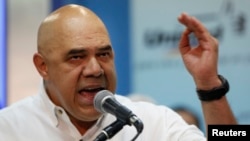For a much-touted "re-launch" of Venezuela's opposition, the turnout was poor: only a few hundred activists joined a rally led by the coalition's new head in Caracas last month.
Despite the enthusiasm and unity shown in two ultimately unsuccessful presidential races against socialist leader Hugo Chavez in 2012 and his handpicked successor Nicolas Maduro last year, opponents are once again divided and demoralized.
"I've marched so many times. I've voted in every election. I've campaigned for a political party in my free time. I've given money. And all for what?" said Griselda Eladio, a 47-year-old publicist and veteran opponent of socialism in Venezuela.
"We're still stuck with these people."
Despondency among opposition rank-and-file deepened this year when months of anti-Maduro protests led by a radical faction were squashed by security forces and triggered splits within the opposition.
The two leading opposition figures, jailed protest leader Leopoldo Lopez and two-time presidential candidate Henrique Capriles, disagree over policies and strategy, killing the sense of unity that helped the opposition gain ground in recent years.
Yet almost despite themselves, national conditions may be slowly turning in favor of the opposition.
A sharp economic decline in the OPEC nation, made worse by falling oil prices, means they could make significant gains at legislative elections in 2015.
A strong result would encourage the opposition to then seek a recall referendum in 2016 to try and end Maduro's presidency halfway through. It could also embolden factions within the ruling Socialist Party disillusioned with Maduro.
He is currently taking a battering in the polls.
Datanalisis, perhaps the country's most respected pollster, said 80 percent of Venezuelans now view the state of the nation negatively and disapprove of the socialist economic model.
Maduro's rating is off from about 50 percent when he came to power to 30 percent now, according to the survey in September, while remarkably 68 percent think he will be out by 2016.
Another poll in October, by Consultores, was similar, with Maduro's approval rating at 34 percent.
That is still a decent level compared to many other leaders around the world, but a far cry from his predecessor Chavez, who ruled for 14 years before his death from cancer in early 2013.
"If the elections were today, the government couldn't win," Datanalisis head Luis Vicente Leon said, predicting the opposition would win with a 20-point margin.
Chavez's 'son'
However, as Leon and others are quick to point out, Chavez was a master at pulling rabbits out of the hat at crucial times and Maduro, his self-declared political "son", learned some of the tricks.
Last year, right before nationwide mayoral elections, Maduro sent thousands of inspectors into shops and businesses to forcibly slash prices and arrest "capitalist speculators".
The populist measure delighted voters and gave the ruling socialists and its allies an unexpectedly convincing win with 54 percent of the vote share versus 44 percent for the opposition.
Though the next elections for the 165-seat assembly have to be held by the end of 2015, and are traditionally in the last quarter, there is speculation the government might bring them forward to reduce fallout from a deteriorating economy.
Some foes suspect Maduro could suspend them altogether, or find a way to ignore the results, though it does not seem likely given the government's pride in its electoral legitimacy and the international consequences of an unconstitutional move.
The government currently controls 99 seats and the opposition 66 after the vote was split roughly 50:50 at the last legislative elections in 2010 but tweaks to the electoral system benefited areas where the ruling Socialists were strongest.
Despite the tough panorama, Maduro remains upbeat and plays on widespread public anger at the violence around the opposition protests this year, when 43 people died, hundreds were injured, and urban centers were engulfed in street battles.
"We are going to have a big victory in next year's elections," he thundered in a recent speech. "There's going to be a tremendous protest vote against the evils of the right, the protests, the economic war."
The opposition coalition's new executive secretary, Jesus Torrealba, insists that change is coming. "The glacier that was 'Chavismo' is starting to melt," he told Reuters recently.
Yet he has his work cut out restoring shattered trust between opposition factions and improving the coalition's poor image among the "Chavistas" it must woo, presenting coherent economic policies, and keeping egos in check.
Polls show opposition leaders Lopez and Capriles have ratings in the 40s, above Maduro, but their camps are still bitterly at odds over this year's protests, and it is telling the opposition is not doing better given Maduro's woes.
Lopez, arrested during the protests and still in jail, is a figurehead for radicals who believe in taking the fight to the streets. Capriles is a more moderate state governor who espouses grassroots work in poor neighborhoods as the way forward.
Lopez's party is pushing for a referendum for a completely new assembly to draft a new constitution, which Capriles and Torrealba oppose.
Many opposition activists are confused as to where to put their energies: grassroots work with Capriles, public rallies with Torrealba, the campaign to free Lopez, or renewed street resistance.
"Me? I'm just going about my life now waiting for Maduro to sink himself," said disillusioned activist Eladio. "If that fails, most of my family are abroad and I'll join them there."





